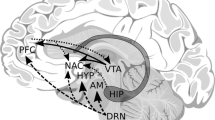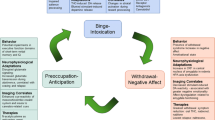Abstract
Rationale
The mGluR5 antagonist MPEP has effects that suggest potential as a pharmacotherapy for cocaine addiction. MPEP can attenuate self-administration of cocaine in animals; however, studies usually involved only acute treatment with MPEP and a single dose of self-administered cocaine. Cocaine addicts use varied amounts of cocaine over long periods of time, and an effective pharmacotherapy would almost certainly require more chronic treatment.
Objectives
The present study (1) compared the effects of repeated treatment with MPEP or the NMDA receptor antagonist dizocilpine on the reinforcing effects of a range of doses of cocaine and (2) determined the pharmacological specificity of the effects of the drugs in attenuating cocaine self-administration compared to food-reinforced behavior. An effective pharmacotherapy should selectively reduce cocaine self-administration.
Materials and methods
Groups of monkeys responded under a fixed-ratio schedule of i.v. cocaine self-administration or food-pellet delivery. The effects of daily treatment with MPEP and dizocilpine were determined under both the schedule of i.v. cocaine injection and food delivery.
Results
Treatment with MPEP and dizocilpine significantly reduced cocaine self-administration, producing rightward and downward shifts in the ascending limb of the cocaine dose–response function. MPEP and dizocilpine selectively and significantly attenuated self-administration of a low reinforcing dose of cocaine compared to food without evidence of tolerance.
Conclusions
Both MPEP and dizocilpine functioned as partially surmountable antagonists of the reinforcing effects of cocaine. The similar effects of the two drugs raises the possibility that MPEP attenuated the reinforcing effects of cocaine, at least in part, via mGluR5-mediated inhibition of NMDA receptor activity.




Similar content being viewed by others
References
Allen RM, Carelli RM, Dykstra LA, Suchey TL, Everett CV (2005) Effects of the competitive N-methyl-d-aspartate receptor antagonist, LY235959 [(−)-6-phosphonomethyl-deca-hydroisoquinoline-3-carboxylic acid], on responding for cocaine under both fixed and progressive ratio schedules of reinforcement. J Pharmacol Exp Ther 315:449–457
Ben-Shahar O, Moscarello JM, Jacob B, Roarty MP, Ettenberg A (2005) Prolonged daily exposure to i.v. cocaine results in tolerance to its stimulant effects. Pharmacol Biochem Behav 82:411–416
Chiamulera C, Epping-Jordan MP, Zocchi A, Marcon C, Cottiny C, Tacconi S, Corsi M, Orzi F, Conquet F (2001) Reinforcing and locomotor stimulant effects of cocaine are absent in mGluR5 null mutant mice. Nat Neurosci 4:873–874
Conn PJ, Pin JP (1997) Pharmacology and functions of metabotropic glutamate receptors. Annu Rev Pharmacol Toxicol 37:205–237
Cornish JL, Kalivas PW (2001) Cocaine sensitization and craving: differing roles for dopamine and glutamate in the nucleus accumbens. J Addict Dis 20:43–54
Gasparini F, Lingenhöhl K, Stoehr N, Flor PJ, Heinrich M, Vranesic I, Biollaz M, Allgeier H, Heckendorn R, Urwyler S, Varney MA, Johnson EC, Hess SD, Rao SP, Sacaan AI, Santori EM, Veliçelebi G, Kuhn R (1999) 2-Methyl-6-(phenylethynyl)-pyridine (MPEP), a potent, selective and systemically active mGlu5 receptor antagonist. Neuropharmacology 38:1493–1503
Gonzalez-Albo MC, DeFelipe J (2000) Colocalization of glutamate ionotropic receptor subunits in the human temporal neocortex. Cereb Cortex 10:621–631
Hof PR, Vissavajjhala P, Rosenthal RE, Fiskum G, Morrison JH (1996) Distribution of glutamate receptor subunit proteins GluR2(4), GluR5/6/7 and NMDAR1 in the canine and primate cerebral cortex: a comparative immunohistochemical analysis. Brain Res 723:77–89
Homayoun H, Stefani MR, Adams BW, Tamagan GD, Moghaddam B (2004) Functional interaction between NMDA and mGlu5 receptors: effects on working memory, instrumental learning, motor behaviors, and dopamine release. Neuropsychopharmacology 29:1259–1269
Huntley GW, Vickers JC, Morrison JH (1997) Quantitative localization of NMDAR1 receptor subunit immunoreactivity in inferotemporal and prefrontal association cortices of monkey and human. Brain Res 749:245–262
Hyytia P, Backstrom P, Liljequist S (1999) Site-specific NMDA receptor antagonists produce differential effects on cocaine self-administration in rats. Eur J Pharmacol 378:9–16
Kalivas PW (2004) Glutamate systems in cocaine addiction. Curr Opin Pharmacol 4:23–29
Kenny PJ, Markou A (2004) The ups and downs of addiction: role of metabotropic glutamate receptors. Trends Pharmacol Sci 25:265–272
Kenny PJ, Paterson NE, Boutrel B, Semenova S, Harrison AA, Gasparini F, Koob GF, Skoubis PD, Markou A (2003) Metabotropic glutamate 5 receptor antagonist MPEP decreased nicotine and cocaine self-administration but not nicotine and cocaine-induced facilitation of brain reward function in rats. Ann NY Acad Sci 1003:415–418
Kenny PJ, Boutrel B, Gasparini F, Koob GF, Markou A (2005) Metabotropic glutamate 5 receptor blockade may attenuate cocaine self-administration by decreasing brain reward function in rats. Psychopharmacology 179:247–254
Lea PM, Faden AI (2006) Metabotropic glutamate receptor subtype 5 antagonists MPEP and MTEP. CNS Drug Reviews 12:149–166
Lea PM, Movsesyan VA, Faden AI (2005a) Neuroprotective activity of the mGluR5 antagonists MPEP and MTEP against acute excitotoxicity differs and does not reflect actions at mGluR5 receptors. Br J Pharmacol 145:527–534
Lee B, Platt DM, Rowlett JK, Adewale AS, Spealman RD (2005b) Attenuation of behavioral effects of cocaine by the metabotropic glutamate receptor 5 antagonist 2-methyl-6-(phenylethynyl)-pyridine in squirrel monkeys: comparison with dizocilpine. J Pharmacol Exp Ther 312:1232–1240
Liu Y, Roberts DCS, Morgan D (2005) Sensitization of the reinforcing effects of self-administered cocaine in rats: effects of dose and intravenous injection speed. Eur J Neurosci 22:195–200
Mello NK, Negus SS (1996) Preclinical evaluation of pharmacotherapies for treatment of cocaine and opioid abuse using drug self-administration procedures. Neuropsychopharmacology 14:375–424
Meoni P, Mugnaini M, Bunnemann BH, Trist DG, Bowery NG (1998) [3H]MK-801 binding and the mRNA for the NMDAR1 subunit of the NMDA receptor are differentially distributed in human and rat forebrain. Mol Brain Res 54:13–23
Movsesyan VA, O’Leary DM, Fan L, Bao W, Mullins PGM, Knoblach SM, Faden AI (2001) mGluR5 antagonists 2-methyl-6-(phenylethynyl)-pyridine and (E)-2-methyl-6-(2-phenylethyenyl)-pyridine reduce traumatic neuronal injury in vitro and in vivo by antagonizing N-methyl-d-aspartate receptors. J Pharmacol Exp Ther 296:41–47
Muly EC, Maddox M, Smith Y (2003) Distribution of mGluR1alpha and mGluR5 immunolabeling in primate prefrontal cortex. J Comp Neurol 467:521–535
Mutschler NH, Covington HE 3 rd, Miczek KA (2001) Repeated self-administered cocaine “binges” in rats: effects on cocaine intake and withdrawal. Psychopharmacology 154:292–300
Nordquist RE, Durkin S, Jaeschke G, Spooren W (2007) Stress-induced hypothermia: effects of acute and repeated dosing of MPEP. Eur J Pharmacol 568:199–202
O’Leary DM, Movsesyan V, Vicini S, Faden AI (2000) Selective mGluR5 antagonists MPEP and SIB-1893 decrease NMDA or glutamate-mediated neuronal toxicity through actions that reflect NMDA receptor antagonism. Br J Pharmacol 131:1429–1437
Paterson NE, Markou A (2005) The metabotropic glutamate receptor 5 antagonist MPEP decreased break points for nicotine, cocaine and food in rats. Psychopharmacology 179:255–261
Pierce RC, Meil WM, Kalivas PW (1997) The NMDA antagonist, dizocilpine, enhances cocaine reinforcement without influencing mesoaccumbens dopamine transmission. Psychopharmacology 133:188–195
Platt DM, Carey GJ, Spealman RD (2005) Intravenous self-administration techniques in monkeys. In: Enna S, Williams M, Ferkany J, Kenakin T, Porsolt R, Sullivam J (eds) Current protocols in neuroscience. Wiley, New York, pp 9.21.1–9.21.15
Pulvirenti L, Balducci C, Koob GF (1997) Dextromethorphan reduces intravenous cocaine self-administration in the rat. Eur J Pharmacol 321:279–283
Ranaldi R, French E, Roberts DCS (1996) Systemic pretreatment with MK-801 (dizocilpine) increases breaking points for self-administration of cocaine on a progressive-ratio schedule in rats. Psychopharmacology 128:83–88
Schenk S, Valadez A, Worley CM, McNamara C (1993) Blockade of the acquisition of cocaine self-administration by the NMDA antagonist MK-801 (dizocilpine). Behav Pharmacol 4:652–659
Sevostianova N, Danysz W (2006) Analgesic effects of mGlu1 and mGlu5 receptor antagonists in the rat formalin test. Neuropharmacology 51:623–630
Shoaib M, Shippenberg TS, Goldberg SR, Schindler CW (1995) Behavioral studies with the glycine partial agonist (+)-HA966 on cocaine-induced locomotor activity and reinforcement. Behav Pharmacol 6:568–576
Spooren WP, Gasparini F, Salt TE, Kuhn R (2001) Novel allosteric antagonists shed light on mGlu(5) receptors and CNS disorders. Trends Pharmacol Sci 22:331–337
Tessari M, Pilla M, Andreoli M, Hutcheson DM, Heidbreder CA (2004) Antagonism at metabotropic glutamate 5 receptors inhibits nicotine- and cocaine-taking behaviours and prevents nicotine-triggered relapse to nicotine-seeking. Eur J Pharmacol 499:121–133
Thomas LS, Jane DE, Gasparini F, Croucher MJ (2001) Glutamate release inhibiting properties of the novel mGlu(5) receptor antagonist 2-methyl-6-(phenylethynyl)-pyrridine (MPEP): complimentary in vitro and in vivo evidence. Neuropharmacology 41:523–527
Yap JJ, Covington HE 3rd, Gale MC, Datta R, Miczek KA (2005) Behavioral sensitization due to social defeat stress in mice: antagonism at mGluR5 and NMDA receptors. Psychopharmacology 179:230–239
Acknowledgments
We thank L. Teixeira and S. Langer for technical assistance.
Author information
Authors and Affiliations
Corresponding author
Additional information
This research was supported by DA17700, DA11054, and RR00168.
Rights and permissions
About this article
Cite this article
Platt, D.M., Rowlett, J.K. & Spealman, R.D. Attenuation of cocaine self-administration in squirrel monkeys following repeated administration of the mGluR5 antagonist MPEP: comparison with dizocilpine. Psychopharmacology 200, 167–176 (2008). https://doi.org/10.1007/s00213-008-1191-y
Received:
Accepted:
Published:
Issue Date:
DOI: https://doi.org/10.1007/s00213-008-1191-y




